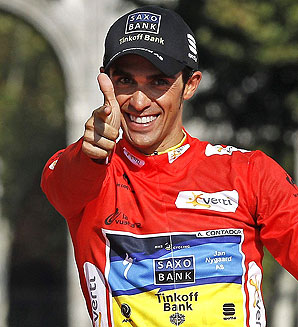Contador shoves drug ban behind him with Spanish Vuelta victory
Contador, now 29, is wiser than the callow prodigy whose first grand tour victory came at the 2007 Tour de France. One measure of that maturity: he seems to have ditched the contrived El Pistolero shtick in favor of more spontaneous celebrations. (Contador's shoot 'em up routine never worked -- off the bike he is a gentle, mellow soul who breeds canaries and goldfinches, for goodness sake.)
After wrapping up this year's Vuelta, Contador held up seven fingers -- one for each of his grand tour victories; unless you are so narrow-minded and officious as to insist, like the sport's governing body, that his wins in the 2010 Tour de France and 2011 Giro d'Italia be excluded from that count. The Spaniard was stripped of those titles after testing positive for traces of clenbuterol in 2010. While Contador's fans stood by him, none of the cycling officials who mattered bought his I-ate-a-contaminated-steak defense.
That ignominious chapter in his life faded a little farther into the background with his latest grand tour win, keyed by a sensational and dramatic kamikaze attack in Stage 17. Just as plenty of people considered ex-doper Alexander Vinokourov's gold medal in the men's Olympic road race a dark day for the sport, Contador's Vuelta triumph, coming so soon after his drugs suspension, wasn't celebrated in all quarters.
What must be celebrated, however, is the audacity, the borderline lunacy he exhibited in Stage 17. The day after a dozen of his patented, fierce accelerations had failed to dislodge race leader Joaquin Rodriguez on a cliff-like climb called the Cuitu Nigru, victory looked like a longshot for Contador. The Katusha rider had taken his best shots in Stage 16, then outsprinted Contador to the line, cadging two valuable seconds.
Contador is at his most dangerous in the high mountains, which, by Wednesday, September 5, the Vuelta peloton had put in its rearview mirror. Described as "lumpy," Stage 17 lacked the soaring passes in which Contador prefers to launch his attacks. But on the more moderate Ozalba climb, he noticed that some of his main rivals were "weakening."
And so, at the base of the Collado de La Hoz, a "second category" climb 51 kilometers from the finish, Contador threw a Hail Mary pass. He went full gas. That sudden surge, wholly unexpected and out of the blue, caught Rodriguez napping. After leading Contador by 38 seconds, the Rodriguez lost 2:38 -- and the Vuelta a Espana -- on the day.
After bridging to a group of 19 escapees, Contador whittled that group down, winning the stage and taking the race lead, which he never relinquished. His celebration at the line was one of unalloyed, fist-pumping, arms-to-the-heavens joy -- he gave the "pistolero" the day off, which was the right call.
Contador later described his gambit as "pure madness." It was unplanned, but inspired, and followed a brief consultation not with the director back in the team car, he recounted, with a pair of inner voices: "I had a devil on one shoulder who told me 'Attack!' and an angel on the other, who told me to be careful."
That positive test for Clenbuterol tells us that, like a lot of cyclists, Contador has heeded the voice of the wrong angel. This victory, secured with wits and panache, justifies the faith placed in him by Saxo Bank-Tinkoff director Bjarne Riis, who re-signed the Spaniard despite Contador's two-year suspension. It's possible Riis felt a special kinship and empathy for the Spaniard: both are members of a select fraternity of riders who have won the Tour de France only to later be stripped of it for doping offenses.
Contador's triumphant return to the sport jacks up interest in next month's official presentation in Paris of the parcours for the 2013 Tour de France, which, according to some rumors, will be more mountainous than usual. That would make sense, following the time-trial-intensive 2012 Grand Boucle. It would also favor Contador over defending champion Bradley Wiggins of Team Sky, whom, one senses, is eager to defend his title with the Spaniard in the field. It rankled Wiggins (justifiably), in the waning days of the most recent Tour de France, when he was asked if his imminent victory might be slightly devalued, considering that Contador had been absent.
"You can only beat who turns up on the day," replied Wiggins, who became the first Briton to win the Tour, and who will have to beat a resurgent Contador, it seems, to become the first Briton to win it twice in a row.





